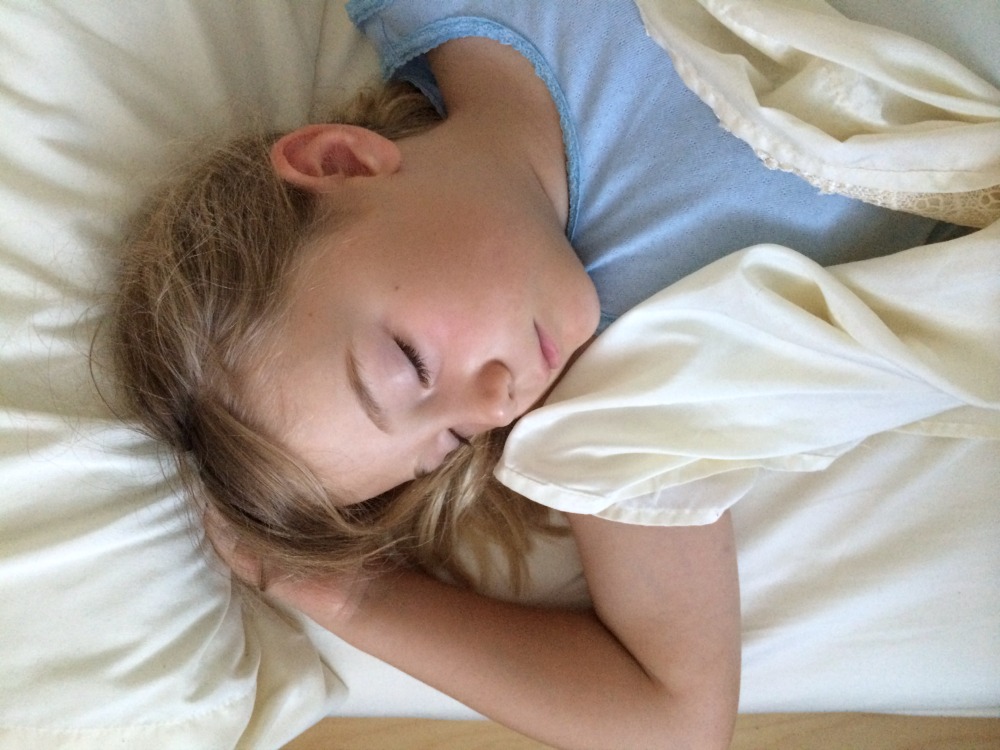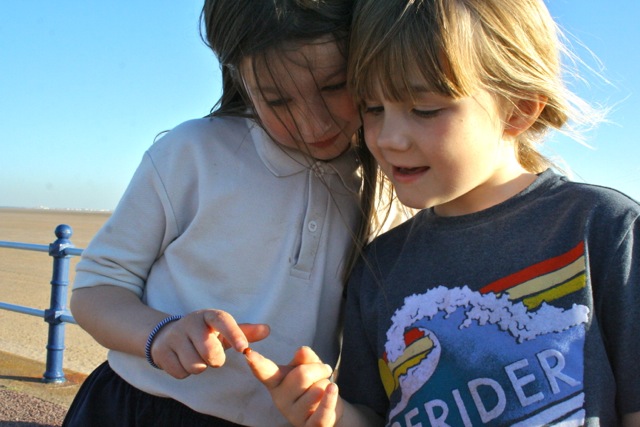
Recently, Flea went on a sleepover with her four best friends.
As 9 year olds are inclined to do, they stayed up way too late, chatting, giggling and watching music videos.
Back home, Flea was full of tales of everything they’d got up to, and at bedtime she wanted to show me some of the videos she had seen with her friends, and the things they had Googled.
It would be fair to say that we are pretty strict about access to technology in our family. Flea isn’t allowed to use search engines or the Internet at all unless she’s sitting next to me, or in school. So I raised an eyebrow and asked what exactly they’d been Googling. My Mum senses were tingling.
I was proved right when Flea immediately flushed and became quite upset. “I closed my eyes and I didn’t want to watch, Mummy!” she insisted.
Actually, the girls really hadn’t seen anything at all troubling, but Flea was upset because she knew she’d broken the rules and been caught out. I tried to explain to her why those rules are in place – because alongside all the funny and brilliant things online there are things that might upset, confuse or frighten her. And especially in someone else’s house, where they may not use filtering the way we do at home, there’s nothing to stop you accidentally finding something that you can’t ever un-see.
“You could end up seeing something about sex that’s really for older people, or there can be people being unkind to animals,” I told Flea. “There are even maniac terrorists chopping people’s heads off, and Lord knows I don’t ever want to see that, much less have you see it.”
Flea nodded earnestly and apologised.
Job done.
Or so I thought until an hour later when Flea appeared at my side in the kitchen, tear-stained face looking up at me. “I’m just a little bit worried about the terrorists,” she whispered.
Bugger.
I spent the next hour snuggled up with Flea on the sofa trying to answer questions that have no (sensible) answer. Why do people chop other people’s heads off? Why do they fly planes into buildings? Are there terrorists in the UK? What if they got a private plane and came to where we live? How do we know that we are safe? What if something happens while I’m sleeping?
What can you say?
You can say that 99.99% of people in the world are fundamentally good and peaceful. You can say that terrorists mostly live in big cities, and most of the wars in the world are happening far away. You can explain that terrorism is about generating fear, and it’s driven by inequality and dogma and the fundamental belief some people have in their right to impose their views and lifestyles on everyone else.
You can talk about all the people and processes in place to help keep us safe, wherever we happen to be. You can point out that there are a thousand things that can go wrong every day, big and small, but the miracle of life is that by and large, everything usually turns out okay, and so long as you’re with people who love you, it’s going to be fine.
But what you can’t say – not really – is “we are safe”. Because we can’t ever know that with absolute certainty.
And you can’t say, “It won’t happen here.” Because it could.
So what do you say?







I can still remember desperately trying to get reassurance from my mum that nothing bad was going to happen to anyone, for the reasons you have mentioned she could never give me the answers I wanted and as a result I was a pretty anxious child. I’m already dreading the times when Cherry starts asking me about the bad things that happen in the world, I know you have to be honest but it’s such an awful thought that we have to teach our children that such terrible things are happening, and even worse try to explain why anyone would do those things x
It’s a sad moment, although I get that it’s necessary and I’d rather Flea heard these things from me.
When 9/11 happened my eldest son was only 9 and as it was everywhere I couldn’t stop him seeing the awful pictures and they also talked about it in school. It was really hard explaining to him what had happened and why and he found it very distressing. I think honesty is the bed policy with children if they are old enough to deal with it and they are exposed to far too much, too young now thanks to the ‘wonders’ of the internet. Like you, I tell them that it happens and that it is unlikely to happen where we are and it seems to be working. We listen to the news in the morning on Radio 1 and they get snippets of news from that and I use it as a chance to talk to them gently about the bad stuff and it seems to help. Having said that, Luc did go into school and tell everyone that they were all going to get ebola and die, so maybe it isn’t?
Oh, the ebola comment did make me laugh – kids do love a bit of drama, don’t they? I can’t imagine how hard it must have been to explain 9/11 – it was just so senseless!
Living in Israel, this was our entire summer and, as far as DD is concerned, the war might be over but the questions are not. DD is only 5.5 so I’m afraid I lied and atm I continue to lie. No the bad people stay in the bad people’s land and they never come to the good people’s land (good people being us, bad being undefined). She is still sleeping in my bed and even then, finds it very difficult not to be scared on her own while waiting to fall asleep. And all this while only having access to Peppa Pig and Bubble Guppies online.
I must confess as I was writing this, I was thinking about my friends in Israel and thinking this is your daily reality. It must be so hard, particularly with a topic that’s so close to home, because how do you stop your own emotions and beliefs from colouring the explanation. I am so sorry for all the kids and families involved in the whole situation.
I love how you said…
“so long as you’re with people who love you, it’s going to be fine.”
That is what i tell my 5 and a half year old but she still has bad dreams and she is scared about bad things happening.
I wish we could protect our girls from the bad things happening or protect them from not knowing them but we can’t. 🙁
It’s ridiculously hard, Otilia, isn’t it? I guess the best we can do is let them talk about their fears but try and distract them until they’re old enough to gain a reasonable perspective, maybe?
We have the same policy in our house as we let Isabelle do her own thing since we caught her watching some teenager videos on Youtube… we had that talk, and she seemed to understand that it’s to protect her, but can we really protect them? I think the answer is unfortunately no. I think you have explained it well.
Thanks Mirka – I think it’s hard because I want Flea also not to be scared of the Internet – after all, I must love it, having made it my career 🙂
I also believe in as much honesty as they can handle. Sometimes you get it right, sometimes you don’t. I find it also pays to remember that the way you worry about something isn’t always the way children do, and that their worries often pass, or evolve. It’s a tough one.
Yes, I must confess that after that night, I didn’t bring up the subject again and Flea’s worries seemed to pass – the upside of a short attention span!
ooh blimey well I think pretty much we do the same as you…. avoid exposure and be pretty honest ( in a low key way) about the world. First News is a fab kids newspaper and does a good job of explaining these things to kids in a way they can digest it.
Thanks for the recommendation, I’ve met a few writers for First News but haven’t ever read it – I’ll take a look.
This really makes me nervous – L is nearly 8 and is fairly bright, so we get questions, all sorts of questions. I’m all about honesty as much as possible but as you say, we can’t guarantee them safety. Mind you I think the bit about 9 year old girls googling without supervision is possibly what freaked me out the most here – there’s so much scary stuff out there which, as you say, you just can’t unsee after.
Absolutely, THAT was a definite call to the other Mums to flag what was going on.